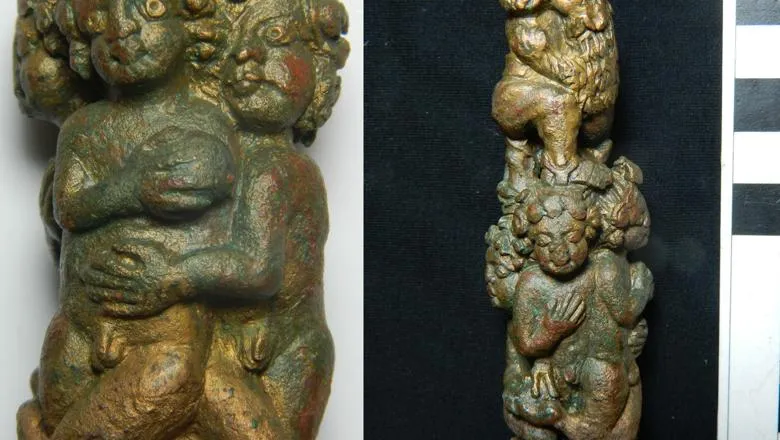
Dr John Pearce
Reader in Archaeology
- Head of Department, Classics (Interim)
Research interests
- Classics
Biography
After a first degree in Archaeology and Anthropology (Cambridge) and MA in Roman archaeology (Durham) my doctoral thesis Roman examined provincial burial practice (Durham). I worked at Oxford as research assistant on the Vindolanda writing tablets project and online editions of ancient documents before coming to King’s in 2003.
Research interests and PhD supervision
- Archaeology of the Roman Empire, especially Rome's north-west provinces and Roman Italy
- Archaeology of death and burial
- Archaeology of documents and literacy
- Archaeology of Roman and pre-Roman landscapes
- Roman small finds; visual culture and Roman bronzes
My research interests lie in Roman archaeology, especially the provinces of north-western Europe and Italy. I am especially interested in funerary evidence as a source for understanding Roman society, including commemorative memorials, burial rituals and the remains of the dead themselves. From 2002-2007 I co-directed a survey project in the Marche region of Italy, which explored the urbanisation process in an upland landscape, characterised by spectacular Iron Age tombs and a dense network of Roman towns. Having previously worked as a post-doctoral research assistant on the Vindolanda tablets website I maintain an interest in Roman frontiers and the archaeology of documents. I have a developing research interest in Roman ‘small finds’, i.e. small objects such as items of adornment, utensils etc., in particular their figural decoration as an understudied aspect of Roman visual culture.
I am interested in supervising PhD students in:
- Archaeology of the Roman Empire
- Archaeology of the dead
- Roman Britain
For more details please see my full research profile.
Selected publications
John Pearce and Jake Weekes eds. Death as a Process. The Archaeology of the Roman Funeral Pearce, R. J. H. (ed.)& Weekes, J. (ed.), 2017, Oxford: Oxbow Books.
Seeing the gods in Roman London. Bowden, H.Pearce, R. J. H.30 Jan 2017Visualising a Sacred City: London, Art and Religion. B. Taurisp. 19-38
Proceedings of the 23rd Theoretical Roman Archaeology Conference, April 4th-6th 2013, King’s College London. Pearce, R. J. H. (ed.), Platts, H. (ed.), Lundock, J. R. (ed.), Barron, C. (ed.) & Yoo, J. H. (ed.), 2014, Oxford: Oxbow.
Teaching
I teach a range of topics in Roman archaeology to undergraduates, from modules covering the entire sweep of Roman art, architecture and material culture to more specialized modules on the archaeology and history of Roman Britain, frontiers and Rome's western provinces, the city of Rome and ancient spectacle culture including the circus and gladiatorial arena.
At MA level I also teach dedicated modules on Britain and neighbouring provinces, the societies and culture of Roman frontiers and (with colleagues) on Latin Epigraphy.
Expertise and public engagement
I collaborate with the Portable Antiquities Scheme (British Museum) in documenting Roman objects found by members of the public across England and Wales. I have advised museums on exhibitions (e.g. ‘Roman Dead: piecing together burials and beliefs in Roman London, Museum of London Docklands 2018). I co-authored the Vindolanda tablets website, intended to enable wider public engagement with this key resource for the study of the ancient world. I am a Fellow of the Society of Antiquaries (elected 2007) and a Museum of London Archaeology Ambassador.
News
'Bite marks' prove Gladiators fought lions – new research shows
Dr John Pearce collaborates on research showing first skeletal evidence of gladiator bitten by lion in combat.

Vase depicting real gladiator fight featured at British Museum exhibition
Dr John Pearce co-leads research concluding vase decoration recorded specific gladiator battle.

Thrown to the Lions? New evidence from Roman Britain executions revealed
Archaeologists have identified an elaborate key as evidence that wild animals were used as agents of execution in Roman Britain during public arena spectacles.

Features
Rhinos and aphrodisiacal sweat: Our fascination with gladiators and the myths they left behind
With the release of Ridley Scott’s Gladiator II, Dr John Pearce at the Department of Classics delves into the popularity of gladiators at the time and how...

News
'Bite marks' prove Gladiators fought lions – new research shows
Dr John Pearce collaborates on research showing first skeletal evidence of gladiator bitten by lion in combat.

Vase depicting real gladiator fight featured at British Museum exhibition
Dr John Pearce co-leads research concluding vase decoration recorded specific gladiator battle.

Thrown to the Lions? New evidence from Roman Britain executions revealed
Archaeologists have identified an elaborate key as evidence that wild animals were used as agents of execution in Roman Britain during public arena spectacles.

Features
Rhinos and aphrodisiacal sweat: Our fascination with gladiators and the myths they left behind
With the release of Ridley Scott’s Gladiator II, Dr John Pearce at the Department of Classics delves into the popularity of gladiators at the time and how...

